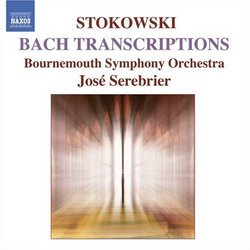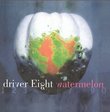| All Artists: Johann Sebastian Bach, George Frederick Handel, Henry Purcell, Leopold Stokowski, José Serebrier, Bournemouth Symphony Orchestra Title: Stokowski: Bach Orchestral Transcriptions Members Wishing: 0 Total Copies: 0 Label: Naxos Release Date: 6/20/2006 Genres: Pop, Classical Styles: Vocal Pop, Opera & Classical Vocal, Forms & Genres, Suites, Variations, Historical Periods, Baroque (c.1600-1750), Modern, 20th, & 21st Century, Instruments, Keyboard, Sacred & Religious, Symphonies Number of Discs: 1 SwapaCD Credits: 1 UPC: 747313288328 |
Search - Johann Sebastian Bach, George Frederick Handel, Henry Purcell :: Stokowski: Bach Orchestral Transcriptions
 | Johann Sebastian Bach, George Frederick Handel, Henry Purcell Stokowski: Bach Orchestral Transcriptions Genres: Pop, Classical Leopold Stokowski's Orchestral Transcriptions are guilty pleasures: high-fat concoctions that are always in danger of becoming campy and gargantuan, something like the classical equivalent of Phil Spector, but without the ... more » |
Larger Image |
CD DetailsSynopsis
Amazon.com Leopold Stokowski's Orchestral Transcriptions are guilty pleasures: high-fat concoctions that are always in danger of becoming campy and gargantuan, something like the classical equivalent of Phil Spector, but without the guns. It is crucial to almost (and I mean "almost") underplay them; they will speak for themselves. The transcriptions are not particularly complicated and lack anything even vaguely revolutionary in their tonality. What we get is a wall of string tone carrying the melodies, usually, with brass and winds used for focus and enlarging. The famous Bach Passacaglia finds the entry of the brass reiterating the ostinato with a handsome blare, and much to the credit of conductor José Serebrier, he does not play all his cards so early in the piece. It builds and builds, and then blows us away. The CD opens with the almost too famous Air from the 3rd Orchestral Suite of Bach. Serebrier gets just the right dark, warm sound from the low strings that one associates with a Stokowski performance. Also included on the CD are Dido's Lament (Purcell), not needing its text in such an expressive performance; a big, toasty version of the Pastoral Symphony from Messiah; and a pairing of Two Ancient Liturgical Melodies by Stokowski himself. The Bournemouth Symphony seem to know they're doing something popular. This is a stunning CD and the engineers have done a great job as well. --Robert Levine Similar CDs
|
CD ReviewsArrangements With Power and Beauty Timothy Kearney | Hull, MA United States | 06/29/2006 (5 out of 5 stars) "Transcriptions for orchestra, once a staple of many orchestras, have fallen out of favor in the past few decades. Tastes seem to lean more toward more authentic renditions of the works of the great composers and for some, orchestral arrangements are nothing short of musical apostasy. Yet we can forget that in many cases, these arrangements were the work of some of music's great legends, one of whom is the well known twentieth century conductor Leopold Stokowski. In high school when I collected LP's, I had two recordings of Bach transcriptions. One was a full price recording by the Philadelphia Orchestra under the baton of Eugene Ormandy. The music was transcribed by the orchestra's arrangers and from time to time I still listen to this set, but now on CD. The second was a budget recording in mono recoding under the direction of Stokowski. One of the major differences I noticed was the lush sound of Ormandy as opposed to the somewhat edgy and exciting sound of Stokowski as opposed to the more lush performances conducted by Ormandy. Sometimes I'd put on the headphones and I'd jump out of my seat. The music had that much power. As I've become more familiar with Bach's music, I have discovered that Stokowski's transcriptions seem to be closer to what the composer intended and at least for me, the orchestral transcriptions helped me come to see the beauty of Bach's music. In the past when I've purchased some recordings of Stokowski's transcriptions under other conductors, I've been disappointed. Something seems to be missing. I purchased this collection hoping it would have some of the magic of the old LP, but didn't expect all that much. As soon as I could I put the CD in the player, went to what is my favorite Stokowski transcription, track 12, the Passacaglia and Fugue. I was transported back in time which was probably not a good thing, considering I was driving, and as I listened to the other Bach music, I remembered why I love these arrangements so. My guess is that conductor Jose Serebrier must also have had an appreciation for Stokowski's genius. Perhaps he was also mesmerized by recordings by Stokowski in his youth. My only wish is that instead of the Handel and Purcell music, more of the transcriptions were included such as the Toccata and Fugue and the Great Fugue, but since the other tracks while not Bach are performed well, I can't complain. " SENSATIONAL NEW CD J. Lambert | London, UK | 06/27/2006 (5 out of 5 stars) "This recording is fantastic! One of the most rewarding I have heard in a long time. Finally there is some warmth and phrasing, something I have missed in many modern recordings. The sound is spectacular. I have heard a few recordings made by Phil Rowlands and conducted by Jose Serebrier, and they all sound magnificent. Bravo to the Bournemouth Symphony, the Leopold Stokowski Society and to Naxos. Let us hope this is the start of a long series." Stokowski Lives Again! J Scott Morrison | Middlebury VT, USA | 06/21/2006 (5 out of 5 stars) "As a ten-year-old piano student I learned the piano transcription of Bach's 'Little' G Minor Fugue for organ done by Olga Samaroff. One day my teacher asked, 'Would you like to hear what Madame Samaroff's husband has done with this fugue? He set it for full orchestra.' When she played a 78rpm recording of Stokowski's transcription I knew I'd entered an entirely delightful world. I bought my own record and played it until the grooves were worn down. I had the temerity, though, to ask my teacher if, when I performed the fugue, I should slow down at the climax like Stokowski did and she explained the difference between a keyboard and an orchestral climax, and said something about Stokowski 'taking liberties' on that account. 'It really works, doesn't it?' I'll say!
When I got this CD I went immediately to track 3 -- that same Little G Minor Fugue -- and heard it with the memory of Stokowski's recording in my mind's ear. This one stacks up beautifully and is in modern sound. Actually, though, that transcription is a bit out of character for Stokowski's Bach settings because it is so dependent on the sound of the wind section. His transcriptions typically are based on massed string sound -- he had, after all, the 'Philadelphia sound' (which, of course, he'd created) to work with, those silky, lush, deeply visceral Philadelphia strings. The Bournemouth strings have nothing to fear, though, when compared with the Philadelphia strings of old. There is much to like on this CD. For instance, there is the utter serenity of the first section of 'Es is vollbracht' (from the St. John Passion) which leads to the quicker triumphal middle section with celebratory brass before returning to the earlier calm. Or the sweet contemplation of 'Komm süsser Tod.' Or the majestic chorale from 'Christ lag in Todesbanden.' But this CD is slightly misnamed: it is not all Bach. There is the Pastoral Symphony from 'Messiah,' a moving transcription of 'Dido's Lament' from Purcell's 'Dido and Aeneas,' and Stokowski's own 'Two Ancient Liturgical Melodies' which is an effective intermingling of 'Veni Creator Spiritus' and 'Veni Emmanuel'. The CD ends with one of Stokowski's most glorious efforts, his transcription of Bach's great Passacaglia and Fugue in C Minor, BWV 582. This gigantic work, so effective in its original organ setting, is perfect for the orchestrational skills of Stokowski who loved nothing better than building layer upon layer of orchestration in a work that starts simply and builds repeatedly to exhilarating climaxes. This is one of Stokowski's (and, of course, Bach's) masterpieces. It is given an exciting reading by José Serebrier and the Bournemouth orchestra, who, by the way, have issued an earlier CD, also justly praised, of Stokowski-Mussorgsky transcriptions including Stoki's own orchestration of 'Pictures at an Exhibition' that is really first-rate. The booklet notes are by Serebrier who, as most will recall, had been Stokowski's assistant at the very beginning of his career and who was present for many, many Stokowski rehearsals and performances. If Stokowski has an heir it has to be Serebrier. He certainly obtains the characteristic Stokowski style and sound in these marvelous performances. The excellent sonics make this very nearly a demonstration CD. Heartily recommended. Scott Morrison" |

